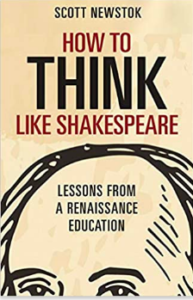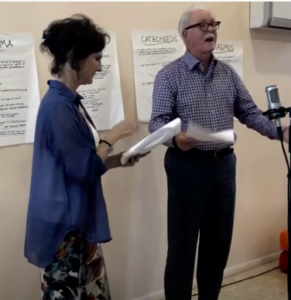
“My conviction is that education must be about thinking—not training a set of specific skills”
I need to gush a bit about this book! It is wise and witty, and it says much of what I say in my book, but from a completely different angle. My book is from the point of view of a practitioner who has spent many years teaching children and adolescents, so it’s very hands-on, with an emphasis on the formative role of drama, dance, and music in the Elizabethan classroom. Newstok looks at thinking from a much more theoretical and academic perspective, and he does it with delightful charm, humor, and insight. I’ve already read it three times, partly because it is dense with information, but mostly because it is fun. And of course it helps that his opinions, like mine, forcefully counter the prevailing gobblety-gook of current educational theory.
Actually, this may be the first of two or three posts because Newstok covers a lot of territory in fourteen brief chapters focusing on fourteen areas of cognition. This post will look at the first three: “Of Thinking,” “Of Ends,” and “Of Craft.”
What, he asks, are the ends of education? In Shakespeare’s day it was the training of capable and critical citizens able to function “for the benefit of the commonwealth.” Today it seems to be test scores. He tells a poignant story about his seven-year-old daughter who, upon being asked if she had learned any new words at school responded, coldly, in a whisper, “Assessment!” He goes on to say, “The reflexive call for educational ‘targets’ in current jargon makes me feel as if we adults have become like William Tell, cruelly aiming arrows at our own children. Our means (passing the test) have overtaken our ends (human flourishing).” That is to say that if you take the long view of current trends in education, we are, in fact, participating in child abuse.
Here is Newstok on thinking:
“Thinking like Shakespeare untangles a host of today’s confused—let’s be blunt: just plain wrong—educational binaries. We now act as if work precludes play; imitation impedes creativity; tradition stifles autonomy; constraint limits innovation; discipline somehow contradicts freedom; engagement with what is past and foreign occludes what is present and native.
“Shakespeare’s era delighted in exposing these purported dilemmas as false: play emerges through work, creativity through imitation, autonomy through tradition, innovation through constraints, freedom through discipline. I stand with the contrarian view that to be a political progressive, one needs to be an educational conservative. Preserving the seeds of time enriches the present—call this heirloom education.”
And more:
“I’m not against testing as a way for teachers to gauge progress within the domain of their own classrooms. But our fixation on tests as target, as the end of education itself—that shoots an arrow right through the heart of thinking, for when the measure becomes the target, it ceases to be a good measure.”
And a final quote, there’s that nasty fact about the cost of testing real, substantive, intrinsic, and individualized achievement: “Rather than measure what matters, assessment measures what’s easy to measure.”
The chapter “Of Craft” I would compare to the current theory of practice devoted to developing “habits of mind.” One develops craft through practice. There are practices, or habits, that value critical thinking, creativity, exploration, reflection, and collaboration. I want to highlight one example, for what should be obvious reasons. Newstok highlights “the scope of collective practices that suffused skilled labor in Shakespeare’s world, where craft was not merely a mechanical process, but also communal, intellectual, physical, emotional. Craft required discipline, enforced by people as well as the object itself. Its practitioners habituated themselves to ever-evolving patterns. While playmaking was never formalized as a recognized London guild, key features of the theater aligned with craft’s dynamic thinking practices.”
My take on much of the above, from my book: “Maybe I’m a bit like Erasmus. I like old ideas.” We have so much we can learn from Elizabethan pedagogy. Strip away the fact that it was only for propertied boys, that it could not be accessed without fluency in Latin, and that it was excessively punitive (I would argue that one, but not here), and there is a wealth of knowledge about how to train better makers and thinkers.
